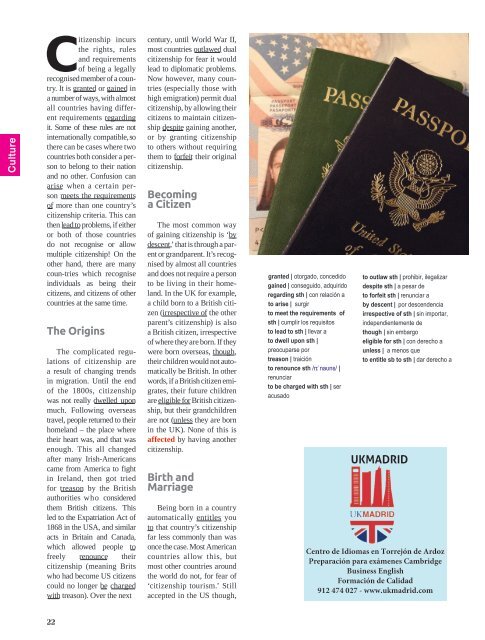EM 4 - 2018 (ESPAÑOL - digitalizado)
You also want an ePaper? Increase the reach of your titles
YUMPU automatically turns print PDFs into web optimized ePapers that Google loves.
Culture<br />
Citizenship incurs<br />
the rights, rules<br />
and requirements<br />
of being a legally<br />
recognised member of a country.<br />
It is granted or gained in<br />
a number of ways, with almost<br />
all countries having different<br />
requirements regarding<br />
it. Some of these rules are not<br />
internationally compatible, so<br />
there can be cases where two<br />
countries both consider a person<br />
to belong to their nation<br />
and no other. Confusion can<br />
arise when a certain person<br />
meets the requirements<br />
of more than one country’s<br />
citizenship criteria. This can<br />
then lead to problems, if either<br />
or both of those countries<br />
do not recognise or allow<br />
multiple citizenship! On the<br />
other hand, there are many<br />
coun-tries which recognise<br />
individuals as being their<br />
citizens, and citizens of other<br />
countries at the same time.<br />
The Origins<br />
The complicated regulations<br />
of citizenship are<br />
a result of changing trends<br />
in migration. Until the end<br />
of the 1800s, citizenship<br />
was not really dwelled upon<br />
much. Following overseas<br />
travel, people returned to their<br />
homeland – the place where<br />
their heart was, and that was<br />
enough. This all changed<br />
after many Irish-Americans<br />
came from America to fight<br />
in Ireland, then got tried<br />
for treason by the British<br />
authorities who considered<br />
them British citizens. This<br />
led to the Expatriation Act of<br />
1868 in the USA, and similar<br />
acts in Britain and Canada,<br />
which allowed people to<br />
freely renounce their<br />
citizenship (meaning Brits<br />
who had become US citizens<br />
could no longer be charged<br />
with treason). Over the next<br />
century, until World War II,<br />
most countries outlawed dual<br />
citizenship for fear it would<br />
lead to diplomatic problems.<br />
Now however, many countries<br />
(especially those with<br />
high emigration) permit dual<br />
citizenship, by allowing their<br />
citizens to maintain citizenship<br />
despite gaining another,<br />
or by granting citizenship<br />
to others without requiring<br />
them to forfeit their original<br />
citizenship.<br />
Becoming<br />
a Citizen<br />
The most common way<br />
of gaining citizenship is ‘by<br />
descent,’ that is through a parent<br />
or grandparent. It’s recognised<br />
by almost all countries<br />
and does not require a person<br />
to be living in their homeland.<br />
In the UK for example,<br />
a child born to a British citizen<br />
(irrespective of the other<br />
parent’s citizenship) is also<br />
a British citizen, irrespective<br />
of where they are born. If they<br />
were born overseas, though,<br />
their children would not automatically<br />
be British. In other<br />
words, if a British citizen emigrates,<br />
their future children<br />
are eligible for British citizenship,<br />
but their grandchildren<br />
are not (unless they are born<br />
in the UK). None of this is<br />
affected by having another<br />
citizenship.<br />
Birth and<br />
Marriage<br />
Being born in a country<br />
automatically entitles you<br />
to that country’s citizenship<br />
far less commonly than was<br />
once the case. Most American<br />
countries allow this, but<br />
most other countries around<br />
the world do not, for fear of<br />
‘citizenship tourism.’ Still<br />
accepted in the US though,<br />
granted | otorgado, concedido<br />
gained | conseguido, adquirido<br />
regarding sth | con relación a<br />
to arise | surgir<br />
to meet the requirements of<br />
sth | cumplir los requisitos<br />
to lead to sth | llevar a<br />
to dwell upon sth |<br />
preocuparse por<br />
treason | traición<br />
to renounce sth /rɪˈnaʊns/ |<br />
renunciar<br />
to be charged with sth | ser<br />
acusado<br />
to outlaw sth | prohibir, ilegalizar<br />
despite sth | a pesar de<br />
to forfeit sth | renunciar a<br />
by descent | por descendencia<br />
irrespective of sth | sin importar,<br />
independientemente de<br />
though | sin embargo<br />
eligible for sth | con derecho a<br />
unless | a menos que<br />
to entitle sb to sth | dar derecho a<br />
UKMADRID<br />
Centro de Idiomas en Torrejón de Ardoz<br />
Preparación para exámenes Cambridge<br />
Business English<br />
Formación de Calidad<br />
912 474 027 - www.ukmadrid.com<br />
22


